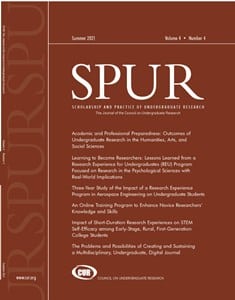SPUR (2021) 4 (4): https://doi.org/10.18833/spur/4/4/4
This article describes a multidisciplinary, asynchronous, 10-hour online training program for undergraduates enrolled in a mentored research apprentice program, addressing communication skills, knowledge of the research process, information literacy, and research ethics. A pretest-posttest survey was completed to assess students’ perceived gains (n = 130) in knowledge and skills. A survey was also administered to faculty mentors (n = 50) to assess observations regarding students’ gains. Results revealed significant perceived gains in all four content areas (p < 0.001) with no significant differences across disciplines. The findings suggest that the training content and format were successful in providing participants with foundational research knowledge and skills. Mentors’ observations support the student findings and identify gains in discipline-specific skills. Implications for undergraduate research programs are discussed.
More Articles in this Issue
- Practice‐ Kerrie R. H. Farkas and Tatiana Pashkova-Balkenhol
SPUR (2021) 4 (4): https://doi.org/10.18833/spur/4/4/3 Abstract:Unprecedented growth has occurred in the development of undergraduate journals over the past 10 years. Yet, despite the numerous benefits that research shows for authors, editors, and faculty mentors involved in undergraduate publications, academic institutions have struggled to sustain student journals over time. Based on the authors’ experience with launching and sustaining a journal over six years and data collected from five years of exit interviews, reflective writing, and surveys, they discuss 10 key steps for creating and sustaining an undergraduate journal and overcoming the obstacles linked to such an endeavor.
- Assessment‐ Kelly Kistner, Erin M. Sparck, Amy Liu, Hannah Whang Sayson, Marc Levis-Fitzgerald, and Whitney Arnold
SPUR (2021) 4 (4): https://doi.org/10.18833/spur/4/4/1 Abstract:As many studies on undergraduate research outcomes are focused on STEM fields, the widely variable experiences in the humanities, arts, and social sciences are less known and harder to study. This article assesses outcomes among students who pursued faculty-mentored research in those fields and concurrently participated in programs administered through UCLA’s Undergraduate Research Center for the Humanities, Arts, and Social Sciences (URC-HASS). As program participants receive support to help counter balance discrepancies across departments and mentors, they also form a distinct sample group useful for statistical analysis. Compared to a quasi-control group of nonresearch students, the research students reported statistically significant better outcomes on average in attaining several of the skills sought by today’s employers, thus demonstrating the potential benefits of undergraduate research in these disciplines.
- ‐ Rebecca M. Jones, Issue Editor
SPUR (2021) 4 (4): https://doi.org/10.18833/spur/4/4/9


